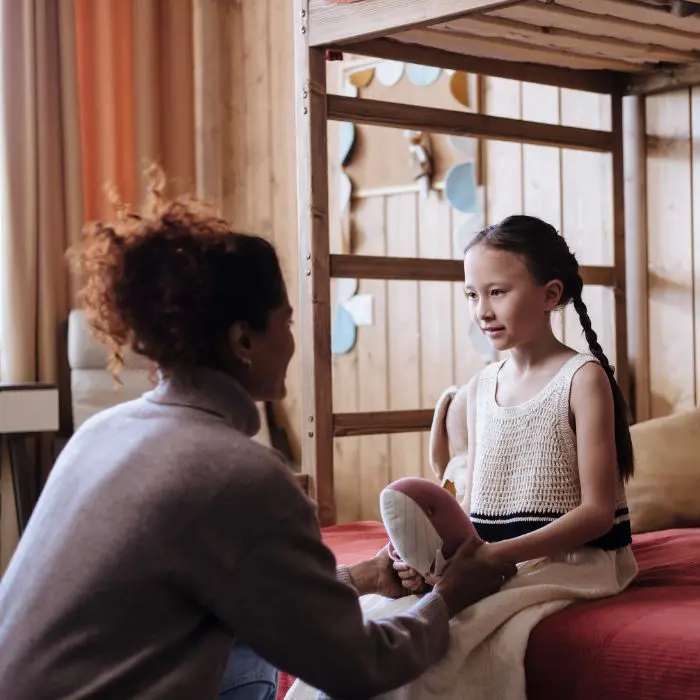Supporting bereaved children with no memories of their person

Grief is most often thought of as missing someone who has died that you knew and spent lots of time with. However, some children can experience grief for someone they only knew as a baby and have never met with conscious memories. For example, they may be grieving for a parent who died when they were too young to remember, a grandparent who died before they were born, or a sibling they lost in infancy.
How to try and understand this unique form of grief
When a child is grieving for someone they don’t have memories of, they’re mourning not just the person, but the relationship that could have been. They could be grieving for: the stories they didn’t create together, the support and guidance they will not receive, the love they have not directly received but know it would have existed. They may even feel a sense of a void in their family narrative. All these feelings are valid and significant to a child who is grieving.
How to recognise the signs of this grief
Children who experience this type of grief may show different signs than traditional grief responses:
- Intense curiosity and asking lots of questions about the person who has died.
- Feeling different from peers who have living grandparents, parents, or siblings.
- Sadness that seems disproportionate to others.
- Anger about missing out on the relationship.
- Guilt about not feeling sad “enough”.
- Creating an imaginative narrative about what life would be like if the person were alive.
- Becoming upset during family celebrations where the absence is notable.
What can you do to support the child?

It is important that their grief is supported in a way that you would any other child who is grieving. It is real and valid, and it’s important that they do not feel dismissed or see it as less significant than grieving someone they spent more time with. This form of grief may feel really confusing for a child, particularly surrounding their emotions. They may even be wondering if they are allowed to feel the way they feel.
Validate their feelings and acknowledge that their grief is real and important. Here are some examples of ways you can do this:
“It’s okay that you miss them. Would you like to talk about your feelings?”
“It’s understandable to feel sad about them and miss them even though you never met them.”
“You can miss someone that you don’t remember, this is absolutely okay.”
“It’s okay to feel angry that you didn’t get to know them.”
Other ways you can support your child:
- Share stories, memories, and create memory boxes.
- They may want to write letters to their person or keep a memory journal.
- Honour their memory on birthdays or anniversaries, this can be done by making a special cake or card.
- You can help by bringing the person to life through storytelling: share specific memories and, if you feel able to, include funny, ordinary moments alongside significant ones.
- Describe their special persons personality, quirks, and interests.
- Visit their grave, memorial, or somewhere important.
- Look through family photos.
- Cook their favourite food.
- Spend time together participating in activities they enjoyed.
- When the child asks questions, try to answer them as honestly as you can. If you need time to think of an answer, let them know that but make sure you answer them later on.
As you know, grief is a lifelong process, so gentle and little steps may be needed for the child to come to terms with grieving for someone they have no memories of.
The intention is not to remove the sadness but to support children to hold their love and connection in healthy ways while enjoying and fully engaging with life. Discover more activities for children with no memories of their person here. We also have a dedicated webpage just for children aged 12 and under, full of activities and ways to cope with grief here.
Suggested books:

Where Is Uncle Al – This book focuses on death before a child has been born with the story following six-year-old Lily as she embarks on a journey to know the uncle she never knew. Recommended for ages 4 to 8 years.
I’ve Never Met My Grandpa – A realistic story of a child’s curiosity about death and lost loved ones. This story paints a picture of a little girl’s curiosity to know her grandfather, who died before she was born. What was he like? Will she ever be able to meet him?
Grief support for kids

We’ve created a special online place for children aged 12 and under to explore their grief.
The page talks directly to bereaved children and will be packed with real voices, activity videos, brand-new Grief Galaxy activity sheets, and more ideas to support grieving kids.
Share our dedicated space with the children in your life and let them meet Winston Bear and explore the emotions around their grief.
Connect with us
Sign up to our newsletter and follow us on social media for all our latest news and advice on supporting grieving children and young people.

